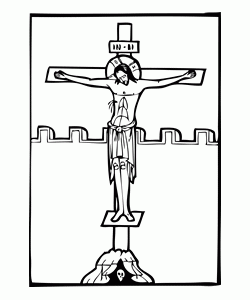 On May 19 we read the Gospel of John 12: 19-36. In these verses Jesus announces, “The hour has come for the Son of Man to be glorified.” He goes on to tell the listening crowd what those words mean.
On May 19 we read the Gospel of John 12: 19-36. In these verses Jesus announces, “The hour has come for the Son of Man to be glorified.” He goes on to tell the listening crowd what those words mean.
Jesus has, the passage tells us, gathered a large following despite the efforts of His enemies. The Pharisees admit that they “can do nothing” because “the whole world has gone after Him.”
Up to now, Jesus has said that His time has not yet come (7:6). But the moment to reveal His purpose has come. He speaks about it in a way that the crowd doesn’t expect—there’s nothing about resistance to Roman oppression or creating an earthly kingdom. He describes a grain of wheat as being able to bear fruit only if it falls into the earth and dies. Then He says something so significant that it is quoted in all four Gospels: “He who loves his life loses it, and he who hates his life in this world will keep it for eternal life.”
This paradoxical statement is a warning to those who intend to be Jesus’ followers. They must be ready for suffering in this world, and not be so attached to earthly life that they forget or reject the Kingdom they have been given. He calls us to “hate” our life in this world, meaning that we don’t cling to it and concentrate on it as if were the whole of life. If we always remember where wholeness really is, we will have eternal life with Him. We will be honored by the Father Himself.
Jesus expresses, as He will again in the Garden of Gethsemane, the troubling of His soul as He faces the end of His life on earth. He knows that humiliation and suffering are coming. But He goes on, “And what shall I say? ‘Father, save me from this hour’? No, for this purpose I have come to this hour. Father, glorify Thy name.” At this, the crowd hears a voice like thunder coming from heaven and saying, “I have glorified it, and I will glorify it again.” That glorification will come in only one way, as Jesus then says:
“…I, when I am lifted up from the earth, will draw all men to myself.” This lifting up from the earth refers to His death on the cross as well as His reunion with the Father in ” the glory which I had with Thee before the world was made” (17: 5).
Though the heavenly voice has come, Jesus tells the people, “for your sake and not for Mine,” they still don’t understand. They ask, “We have heard from the Law that the Christ remains for ever. How can you say that the Son of man must be lifted up?”
Jesus does not remind them that the Old Testament (“the Law”) prophesies the death of the Christ, the Messiah. He simply urges them to “walk while you have the light, lest the darkness overtake you.” Simple, stark, and urgent words for every one of us to take to heart.
